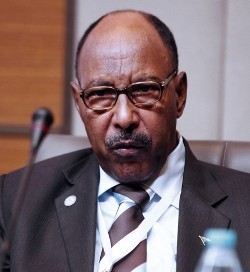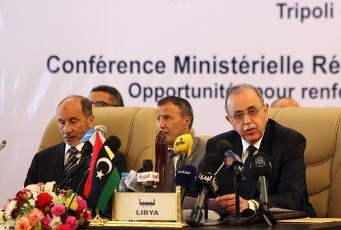Libya becomes first nation to receive Sudan defence minister after ICC warrant
March 12, 2012 (KHARTOUM) – The Sudanese defence minister Abdel-Rahim Mohamed Hussein took part in a regional conference in the Libyan capital Tripoli making it his first trip abroad since the International Criminal Court (ICC) issued an arrest warrant for him earlier this month.

Other countries participating included Algeria, Chad, Egypt, Mali, Mauritania, Morocco, Niger and Tunisia. Most delegations were led by interior and defence ministers.
The opening of the gathering was addressed by Libya’s interim Prime Minister Abdel Rahim al-Kib and National Transitional Council (NTC) chairman Mustafa Abdel Jalil.
The ICC judges decided earlier this month that there were sufficient grounds to hold Hussein responsible for 20 counts of crimes against humanity, including persecution and rape, and 21 counts of war crimes, including murder and attacks on civilians between the years 2003-2004 in Sudan’s western region of Darfur.
Khartoum said it is not concerned with the warrant as it is not a member of the Hague based court. Hussein joins Sudan’s president Omer Hassan al-Bashir who was indicted by the ICC in 2009. The Sudanese government have refused to handover any of its citizens to the court.

The visit was criticised by the United States which said it brought up the issue with Libyan officials. But the European Union (EU), which took the lead on enforcing a No Fly Zone during Gaddafi’s crackdown on opposition last year, maintained silence.
Libya’s National Transitional Council (NTC) which managed to topple Muammar Gaddafi’s 41-years old rule last October, has asked the United Nations Security Council (UNSC) to involve the ICC in investigating atrocities committed following the outbreak of the uprising in early 2011.
The ICC issued an arrest warrant for Gaddafi, his son Saif al-Islam and the ex-spy chief Abdullah al-Sanoosi for crimes against humanity. Saif al-Islam was captured by local rebels near the border with Niger last November but they have refused to hand him over to Tripoli’s central authority or the ICC.
Gaddafi was killed by Libyan rebels while Sanoosi remains at large despite reports of his arrest.
Mohammed al-Alaqi, the former justice minister at the NTC suggested that receiving Bashir was more of a pragmatic decision.
“I personally agree that there is a moral obligation to arrest Bashir, but this is not the position of the Libyan government right now – they are racing against time to restore law and order and stability to the country so the considerations of the government are different… and the world should not forget that the Libyan revolution and people received considerable support from the government of Sudan in overthrowing Gaddafi,” al-Alaqi said.
At the Tripoli conference which concluded today, the participating countries agreed to work together to secure their borders in a move to clamp down on militia clashes and weapons smuggling in the wake of the Arab Spring uprisings.
(ST)
